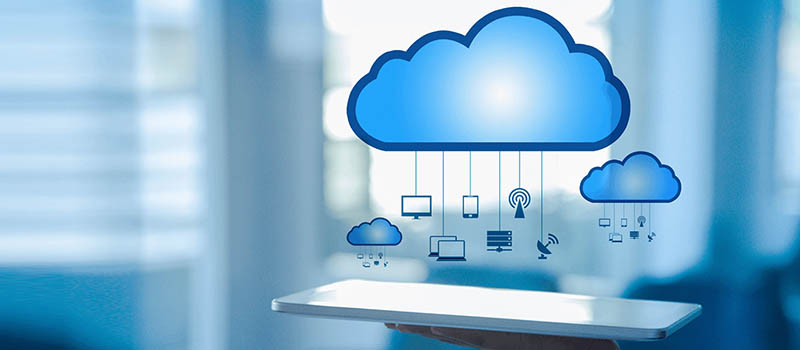By: Sarah Goltz, Content Manager on April 30th, 2021
Should I Have a Physical Backup and Disaster Recovery Device or Move to the Cloud?
As most business leaders know, data security can only go so far in protecting against the newest cyber threats. As hacking methods become more sophisticated, it's important to have a disaster recovery strategy alongside standard data protection solutions. This includes data backups.
Many business owners are torn between using physical backups and backing up data on the cloud. For this reason, here are some pros and cons of physical vs cloud backups, and other disaster recovery solutions for small businesses.
Understanding Data Backup and Disaster Recovery Solutions
Data backup and recovery plans ensure that a copy of your data is stored in a location separate from the original data. This way, if any of your sensitive information is lost, you are able to restore it. Data loss can occur due to:
- Natural disasters such as hurricanes, floods, etc
- Ransomware attacks that compromise sensitive types of data
- Data mishandling such as accidental deletion or leaks
- Insider threats
Disaster recovery is crucial so you have a plan to get your data center back up and running so you can resume business operations as soon as possible.
It is important that you have a written plan containing all the procedures for each disaster. Knowing what to do when something happens helps you respond quickly, minimizing recovery time.
Pros of Physical Backups
The nice thing about having a physical backup storage device is that you have all your data physically stored right where you can see it. You will want it to be in a secure space with surveillance to ensure it remains safe from any damage, but if you have this environment, it is unlikely that it will be tampered with.
Physical backup drives and servers are also very fast, so you don’t have worry about waiting a long time if you need access to a large file.
Cons of Physical Backups
The cons to physical data protection tools are that it is not safe from physical damage if it is not secure. If anyone was to get their hands on it, they could cause destruction very easily to the system and it would need to be replaced which can be costly, which is why we recommend you place this device in a very secure area.
It is also important to ensure you have a warranty on your device because if the server dies, you will need to go to the manufacturer to get it back up and running. If you don’t have the warranty, it can be a substantial cost that would be out of pocket. We heavily encourage to have it covered for the lifetime of the server.
Another disadvantage is that you do not have access from anywhere like you do with the cloud backup. Many companies have struggled with remote workstations and employees needing files they couldn't access remotely.
Physical backups can be hard to scale if you have a large company with many employees. Increasing backup storage requires purchasing, storing, securing, and managing more equipment.
Pros of Cloud Backup
Cloud backup is a remote and online backup that stores important data on an internet-based cloud server. The convenient thing about this is that all the data on cloud is all automatically stored and available to access from anywhere as long as you have internet access.
If you suddenly require more space for storage, no installations are necessary, you can simply purchase more with the click of a button. It is also very hands-off. All your backups can be managed by a trusted managed service provider to ensure it is receiving the necessary updates to stay up and running and secure.
For this reason, it is important to know you are working with a reliable and reputable company that will properly manage cloud backup.
Cons of Cloud Backup
Cloud storage is only as good as your internet access. For instance, if your internet crashes or is acting up it can make accessing files extremely difficult. Trying to access files with a slow internet connection can be a huge headache and will require some waiting around. If your internet goes down, you will not be able to access your files in the cloud at all.
For this reason, it is important to stay on top of important updates and network security to ensure that you have fast internet connection and no delays or crashes.
Should You Hire Disaster Recovery Consulting Services?
Creating a plan of action is key to cybersecurity preparedness. If you're looking into disaster recovery consulting services, you would likely benefit from a partnership with an MSP. An experienced IT provider will have the knowledge to help you:
- Create a business continuity and disaster recovery plan
- Ensure your business meets any regulatory compliance requirements
- Educate staff on data protection and recovery practices
- Find cost-effective solutions to ensure data security such as MFA, phishing training, and access controls
To learn more about data security, read our blog: Data Protection vs Data Security.
Partnering with an MSP is a great first step in securing your It environment with IT professionals in your corner. If you're ready to speak with an expert about how to protect enterprise data and optimize your security posture, click the button below.
Read On
.jpg?width=352&name=Blog%20Banners%20(62).jpg)
Improve Your Retail Surveillance: Retail Store Security Cameras
Running your business while balancing good security and surveillance can be daunting, especially...
.png?width=352&name=Blog%20Banners%20(86).png)
Toner vs Ink Printers: What’s the Difference?
With so many variations of business printers and functions, there are just as many terms to know...
.png?width=352&name=Blog%20Banners%20(40).png)
Can My Business Get Sued for a Cybersecurity Breach?
The last thing you want to worry about when running a business is the idea of a cyber breach. Even...




